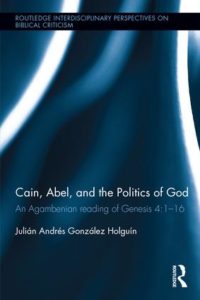Working from the perspective of a migrant scholar, Julián Andrés González combines textual criticism with a critical theory framework to challenge long-standing traditions of exegetical interpretation of the Cain and Abel story in Genesis 4. He argues that textual ambiguities of the Hebrew version of the text are pronounced and that biblical scholarship (largely following Augustine) has tried to explain away a number of its evident theological problems. These traditions, he suggests, fall into two traps. In the first trap, if Cain murders Abel because Abel is favored by God, there is no textual evidence to warrant such favor, making God’s favoring Abel arbitrary. However, even if we were to accept that Abel’s favor is justified, God’s refusal to kill Cain afterwards would not be. González shows that God, as the sovereign, must bear ultimate responsibility for the outcome of this situation, a conclusion that he reaches through a theoretical framework informed by the work of Agamben, Rancière, and Kristeva.
In the introduction, González lays out several questions that arise from a look at the text in itself, drawing the reader’s attention to how it is not necessarily easy to establish Abel rather than Cain as the text’s protagonist. Here, he uses Agamben’s concept of homo sacer, Rancière’s ethical community, and Kristeva’s idea of foreignness to build his theoretical framework. In chapter one, he critiques the assumptions of ancient exegetes from the Septuagint to Augustine, paying attention to how their interpretations assume that Cain deserves exclusion, even though there is no textual evidence to support this conclusion. In chapter two, González details how the historical-critical approach that dominates modern scholarship today has left uninvestigated crucial questions, such as the problem of divine sovereignty. For this reason, González advocates that we engage with the Bible through an unapologetically political lens. In chapter three, he turns to four literary pieces – selected because they take the Cain and Abel story as their inspiration – that he feels more adroitly tackle the real problems of the biblical text through their description of struggle with an indifferent, sovereign God. Finally, in chapter four, González concludes that God drives Cain to murder Abel through arbitrary favor, a fact compounded by God’s unwillingness to allow Cain to atone for his crime on account of the mark that Cain is given.
For González, Cain’s experience mirrors that of migrants who have been made ‘other’ by the state. He claims that adopting a hermeneutic that more accurately accounts for the ambiguities in this story will allow us to see the arbitrariness and injustice at play today in the exclusion of migrants from Western political structures.
González’s project is ambitious in how it uses textual criticism, detailed historical analysis of the historical exegesis of this passage, and modern critical theory methods. He argues persuasively that power and tradition have prevented real hermeneutical engagement with the problems of the text, particularly those related to unquestioning obedience to God. However, the problem of divine sovereignty, if González is indeed correct (and I believe that he is), remains unresolved by the end of the text. It is clear that the political sovereign is being critiqued for its treatment of migrants. However, the Cain and Abel story itself concerns God rather than the state, leaving this reviewer to wonder whether the same kind of critique could be applied to the divine sovereign as has been made to the political sovereign. Perhaps the author could clarify how far to take this critique and to whom it ultimately applies.
González’s critical engagement with Genesis 4:1–16 highlights the millennia of exegetical assumptions that have obscured an entire category of exegetical questions that still need to be raised. Hebrew scholars should read this book for the sheer depth of its textual analysis. Theologians and pastors may also benefit from wrestling with González’s argument given its political and theological implications. While complex, this book showcases the value of re-interpreting these ancient stories to illuminate our present situation.
Boston University




